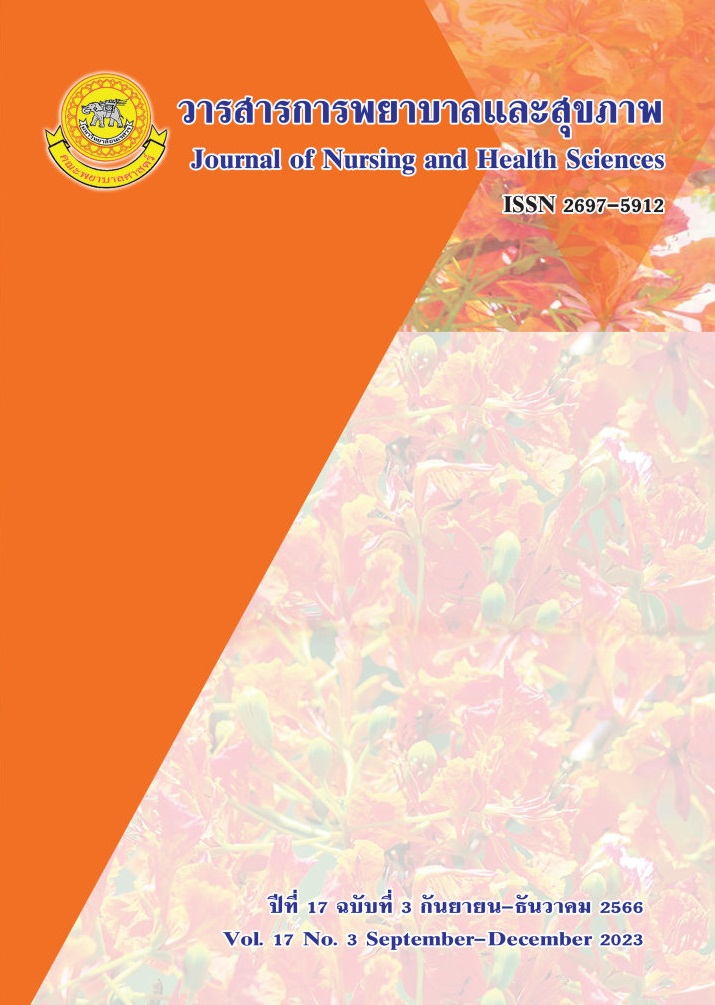การดูแลตนเองเมื่อมีภาวะเบี่ยงเบนด้านสุขภาพของผู้ป่วยโรคปอดอุดกั้นเรื้อรัง ที่เคยมีอาการหายใจลำบากเฉียบพลัน
Main Article Content
บทคัดย่อ
การศึกษาเชิงคุณภาพครั้งนี้ มีวัตุประสงค์เพื่ออธิบายการดูแลตนเองเมื่อมีภาวะเบี่ยงเบนด้านสุขภาพของผู้ป่วยโรคปอดอุดกั้นเรื้อรังที่เคยมีอาการหายใจลำบากเฉียบพลัน ผู้ให้ข้อมูลคือผู้ป่วยโรคปอดอุดกั้นเรื้อรังที่เคยมีอาการหายใจลำบากเฉียบพลัน โดยใช้สัมภาษณ์แบบเจาะลึก การสังเกตแบบไม่มีส่วนร่วมควบคู่ไปกับการสัมภาษณ์ และการบันทึกภาคสนาม ร่วมกับการวิเคราะห์ข้อมูลโดยวิธีของโคไลซี่ (Colaizzi) ผลการศึกษาพบว่า การดูแลตนเองเมื่อมีภาวะเบี่ยงเบนด้านสุขภาพของผู้ป่วยโรคปอดอุดกั้นเรื้อรังที่เคยมีอาการหายใจลำบากเฉียบพลัน สามารถแบ่งการดูแลตนเองได้เป็น 6 ประเด็น คือ 1) หลีกเลี่ยงสิ่งกระตุ้นที่ทำให้เกิดอาการหอบกำเริบ ได้แก่ การเลิก และหลีกเลี่ยงบุหรี่, หลีกเลี่ยงฝุ่น และควัน, หลีกเลี่ยงสถานที่แออัด 2) ปฏิบัติตามคำแนะนำของทีมสุขภาพอย่างเคร่งครัด ได้แก่ การฝึกหายใจ, การออกกำลังกาย, การใช้ยาตามคำแนะนำ, และการไปตรวจตามนัด 3) เตรียมความพร้อมต่อภาวะฉุกเฉิน ได้แก่ การเตรียมยาพ่นติดตัว, การเตรียมเครื่องพ่นยา และออกซิเจน 4) จัดการเมื่อเกิดอาการหอบกำเริบ ได้แก่ การหยุดทำกิจกรรมเพื่อให้อาการเหนื่อยลดลง, การไปโรงพยาบาลเมื่อมีอาการรุนแรง 5) การขอความช่วยเหลือเมื่อมีอาการหอบมากขึ้น ได้แก่ การขอความช่วยเหลือจากคนใกล้ชิด, การขอความช่วยเหลือจากเพื่อน, ขอความ ช่วยเหลือจากเจ้าหน้าที่ของรัฐ 6) สังเกตตนเองเรียนรู้ เพื่อป้องกันการหอบกำเริบซ้ำ และปัจจัยสนับสนุนที่มีผลต่อการดูแลตนเอง ได้แก่ ความหวังที่จะมีสุขภาพดี การมีชีวิตอยู่เพื่อบุคคลที่รักเป็นพลังผลักดันให้ดำเนินชีวิตต่อไป และอีกปัจจัยหนึ่งคือครอบครัว คนใกล้ชิดเป็นคนที่ช่วยดูแลและให้การสนับสนุนในการดูแลตนเอง ส่วนปัจจัยที่เป็นอุปสรรคในการดูแลตนเอง ได้แก่ การประกอบอาชีพและสิ่งแวดล้อมรอบตัว ข้อเสนอแนะ : ผลการศึกษาครั้งนี้สามารถนำความรู้ที่ได้เกี่ยวกับการดูแลตนเองเมื่อมีภาวะเบี่ยงเบนด้านสุขภาพของผู้ป่วยโรคปอดอุดกั้นเรื้อรังที่เคยมีอาการหายใจลำบากเฉียบพลัน และผลการศึกษาใช้ประกอบเป็นข้อมูลในการพัฒนารูปแบบ การดูแลผู้ป่วยโรคปอดอุดกั้นเรื้อรังที่เคยมีอาการหายใจลำบากเฉียบพลัน
Article Details

อนุญาตภายใต้เงื่อนไข Creative Commons Attribution-NonCommercial-NoDerivatives 4.0 International License.
เอกสารอ้างอิง
Berg, K., & Wright, J. L. (2016). The pathology of chronic obstructive pulmonary disease: progress in the 20th and 21st centuries. Archives of pathology &laboratorymedicine, 140(12), 1423-1428.
Boonreung, J., Suwanno, J., Phonphet, C., Petsirasan,R, & Thiamwong, L. (2017). Predictors of chronic obstructive Pulmonary disease sever eacute exacerbation. Thai Journal of Cardio- Thoracic Nursing, 28(1). 111-128. [In Thai].
Global initiative for Chronic Obstructive Lung Disease. (2023). Golbal Strategy for the diagnosis,management, and prevention of chronic obstructive pulmonary disease 2023 report. Retrieved April 1, 2023, from https://goldcopd.org/wp-content/uploads/2023/03/GOLD-2023-ver-1.3-17Feb2023_WMV.pdf
Guba E. G., & Lincoln. Y. S. (1989). Fourth generation evaluation. Newbury Park, CA: Sage.Halpin, D. M., Miravitlles, M., Metzdorf, N., & Celli, B.(2017). Impact and prevention of severe exacerbations of COPD: a review of the evidence.International journal of chronic obstructive pulmonary disease, 12, 2891-2908.
Inchai, P., Jumniensuk, A., Durongdej, S., Sonthipho, P.,Bandit, J., & Eimsaard, C. (2018). Self care behaviors among elderly peoplewith chronic diseases in Pamok District, Angthong Province.Journal of the Department Services, 43(4),100-104. [InThai].
Kamthong, S. (2019). Factors predicting acute exacerbation in patients with chronic obstructive pulmonary disease. Master Thesis (Nursing),Naresuan University, Phitsanulok. [In Thai].
Ko, F. W., Chan, K. P., Hui, D. S., Goddard, J. R.,Shaw, J. G., Reid, D. W., & Yang, I. A. (2016).Acute exacerbation of COPD. Respirology, 21(7),1152-1165.
Lei, S., Li, M., Duan, W., Peng, C., Chen, P., & Wu, S.(2020). The long-term outcomes of tobacco control strategies based onthe cognitive intervention for smoking cessation in COPD patients.Respiratory medicine, 172, 1-6.
National Health Security official, (2020). NHSOAnnual Report 2020.Retrieved April 1, 2023, from https://www.nhso.go.th/page/audit_annual.
Ngoenthae, D. (2017). Self-care experience of people with chronic obstructive pulmonary disease (COPD) exacerbation. Master Thesis (Nursing),Mahidol University, Bangkok. [In Thai].
Orem, D.E. (2001). Nursing: concepts of practice (6th ed.). St. Louis: Mosby.
Poko, S., Changmai, S., &Toskulkao, T. (2019). The effects of hope promotion program on hope index in stroke Patients during post-acute phase.Nursing Journal of the Ministry of Public Health,29(3), 80-93. [In Thai].
Puttavichaidit, P., & Chinasote, Y.(2022) Outcome evaluation of care among patients with chronic obstructive pulmonary Disease in Luangphorpern Hospital under the coronavirus disease 2019 (COVID-19) pandemic. Journal of Health and Environmental Education, 7(4), 51-63. [In Thai].
Rodkantuk, E. (2017). Acute exacerbation symptoms among patients with chronic obstructive pulmonary disease, triggering factors, and management strategies. Master Thesis (Nursing), Walailak University,Nakhon SiThammarat. [In Thai].
Sripariwut, E.,Wanteeraprasert, A., Jitphiwngam, W., &Pongcharoen, S. (2016). Common chronic diseases internal medicine guidelines for diagnosis and treatment.Phitsanulok: Naresuan University. [In Thai].
Thoracic Societyof Thailand under Royal Patronage,(2022). Guidelines for the diagnosis and treatment of chronicobstructive pulmonary disease 2022.Bangkok: Phaphphimph. [InThai].
Tiraputpong,W., 2021. Cardiopulmonary rehabilitation.Bangkok: ID digital print. [InThai].
Treewichar, W., Khungtumneam, K., & Buajalearn, H.(2017). Guideline for management the acute exacerbation at home by chronic obstructive pulmonary disease: COPD patient. Journal of The Royal Thai Army Nurses, 18(1), 216-221. [InThai].
Uamtanee, A. (2016). Qualitative research innursing (3nd ed.).Bangkok: Chulalongkorn University Printing House. [InThai].
Uttaradit hospital. (2023). Uttaradit hospitalannual report 2023. Uttaradit: Uttaradit hospital. [In Thai].
Vogelmeier, C. F., Roman-Rodriguez, M., Singh, D., Han, M. K., Rodriguez-Roisin, R., & Ferguson, G. T.(2020). Goals of COPD treatment: focus on symptoms and exacerbations. Respiratory medicine, 166, 1-7.
Wandao, Y., Chinnawong, T., Chalothorn, U.,& Tipwong, A. (2018) The experience of self-management in patients with uncontrolled type 2 diabetes, Sadao Hospital, Sadao, Songkhla.Songklanagarind Journal of Nursing, 38(3),54-64. [In Thai].
World Health Organization. (2022). Chronic obstructive pulmonary disease (COPD). Retrieved March 30, 2023. From https://www.who.int/news-room/factsheets/detail/chronic-obstructive-pulmonarydisease-(copd).


